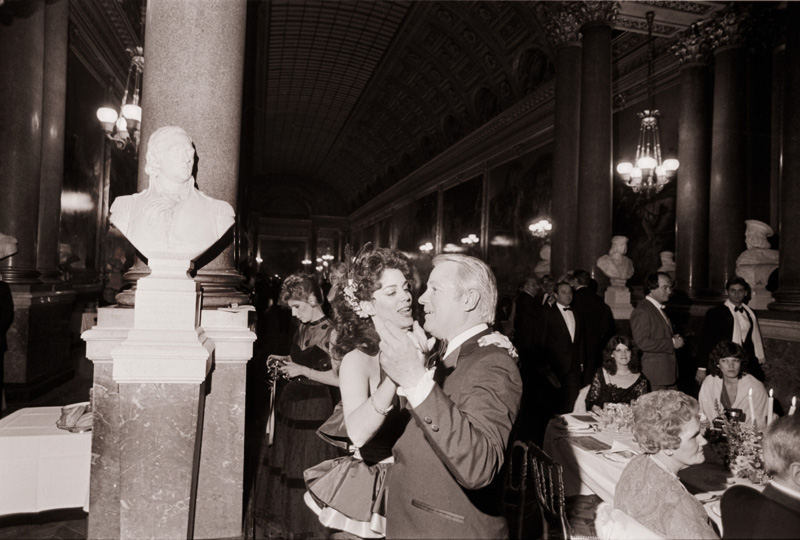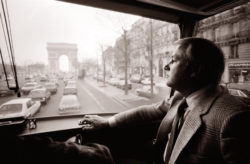Latest
Mr. Edwards Goes to Paris: A Conversation with Photographer Philip Gould
Photographer Philip Gould remembers Edwin Edwards' legendary 1984 voyage
Published: September 15, 2015
Last Updated: January 3, 2019
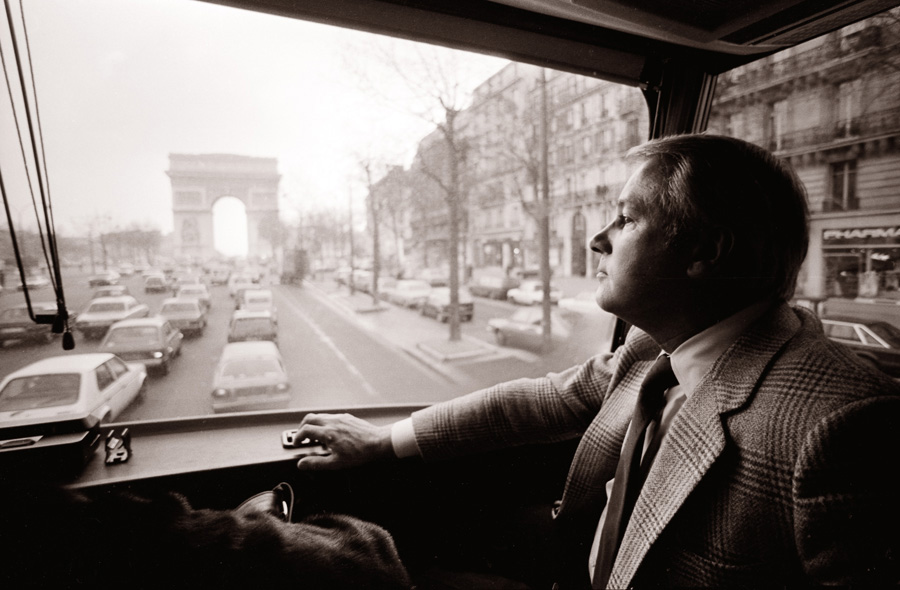
©Philip Gould
Edwin Edwards gazes at the Arc de Triomphe from a bus window shortly after arriving in Parish.
Editor’s Note: In 1984 Lafayette-based photographer Philip Gould undertook one of his most memorable freelance newspaper assignments: meeting up with Governor-elect Edwin Edwards and 618 of the politician’s friends and associates on a lavish celebratory trip to Paris following Edwards’ unprecedented third gubernatorial victory. Proceeds from the $10,000-per-person excursion — which included such highlights as a dinner party at the Palace of Versailles, a gambling spree in Monte Carlo and Mass at Notre Dame — were used to retire Edwards’ $4 million campaign debt. A press release issued by Edwards’ office boldly claimed the event marked “the single largest political fund-raiser ever held any place in the world.”
Gould sat down with David Johnson, former editor of Louisiana Cultural Vistas, to discuss the prints that resulted from this history-making — and eyebrow-raising — weeklong transatlantic jaunt.
David Johnson: It was January of 1984, Edwin Edwards had just won an unprecedented third term as Louisiana’s governor and he decides he’s going to take, as I’ve read, 618 friends to France on a big celebratory trip.
Philip Gould: Quote, unquote, friends and supporters.
Johnson: Yes, on a big trip, of which the proceeds are going to be used to retire his campaign debt.
Gould: Correct. The ticket was ten thousand dollars apiece.
Johnson: So obviously only a select group could afford to join this.
Gould: It was a new opportunity for folks who hadn’t yet gotten on the train of supporters, I would say.
Johnson: These were people who just wanted to get cozier with the governor?
Gould: I couldn’t read their minds. There were a lot of people who went over. I think that a fair number of people who went who paid the cost, but did not pay the full fare — legislators, I don’t know who. But there were a few who were like that.
Johnson: How did you get in with this entourage?
Gould: That’s a good question. I was good friends with Denis Reggie, who was Edwards’ photographer for the trip. I was going to be in Paris visiting my French girlfriend at the time and knew this trip was happening. So I called Robert Hart, who was photo editor of the Times-Picayune at the time. I said, “Edwards is taking 600 supporters on a trip to France and I would love to shoot it for you as you need it.”
I don’t remember what he paid me. It was just a freelance thing. He later said, “If I had known how big a deal this was, we would have sent over our own people.”
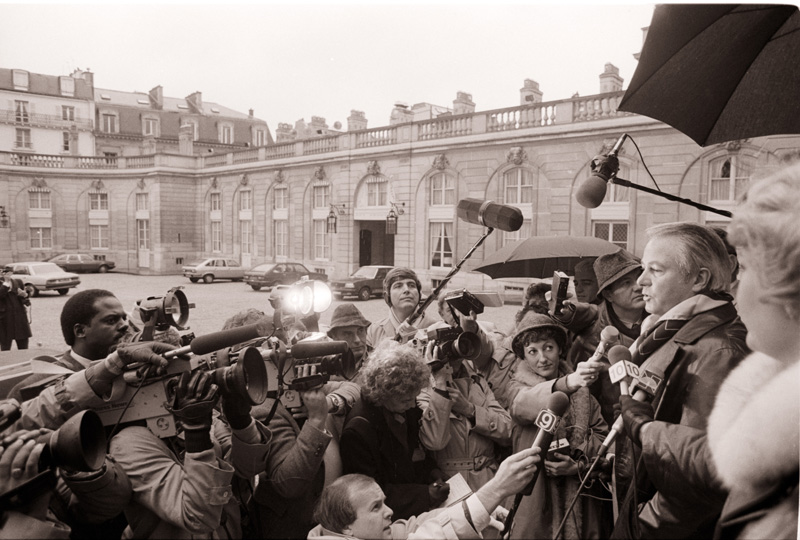
Governor-elect Edwin Edwards meets with the press outside the Élysée Palace, official residence to then French President François Mitterrand. © Philip Gould
Johnson: You latched onto the right opportunity.
Gould: Well there you are. It was an interesting goodwill trip, quite unique.
Johnson: When did you meet up with Edwards?
Gould: I knew when they were coming. I went to the airport and met them at the airport. Actually rode with the group into Paris. There’s this one shot of him looking out the window of a bus as we passed the Arc de Triomphe. That was taken when he first came into Paris.
Johnson: What was the crowd like at that point? Was it already a non-stop party?
Gould: No, no. It was pretty tranquil on the bus. People were just visiting. Just to get back to that moment, I knew the route the bus was going to take to the hotel. They were coming in from the west. You can enter Paris that way from the airport. I knew that at some point they were going to turn onto a street headed toward the Arc de Triomphe.
Johnson: You knew to frame that moment.
Gould: I knew it was going to happen. The moment the bus turned the corner, I walked up to Edwards and said, “Governor, I would love to get a photo of you and the Arc de Triomphe.” He said, “Okay, what do I need to do?” “Just give me a profile,” I said. I shot several frames.
Johnson: You have that split second when you’re passing that intersection, I suppose?
Gould: It’s a long street full of traffic. We actually moved slowly. I was pretty happy about the photograph.
Later it got a little crazy. I have this vivid memory of Gus Mijalis, who was on the trip, opening up the hotel window, holding a bottle of champagne raising his hands shouting, “We are here, Paree.” I understood Gus was a political supporter and fish wholesaler in Shreveport.
Johnson: How many days did you trail along with the group?
Gould: I was there almost the whole time.
Johnson: They left Paris and they went down to Monte Carlo.
Gould: I didn’t go there.
Johnson: That’s where reporters mentioned Gus going into the casino and winning big, along with Edwards, at the craps tables. I know the group had dinner at the Palace of Versailles, which must have been quite a scene. Who gets that privilege?
Gould: Here is the brutal truth. People can rent the Palace of Versailles. I suspect they do it fairly often.
Johnson: If you can pay the bill.
Gould: I don’t know how often it happens. It was a pretty amazing place. At one point later in the evening, Edwards put on a waiter’s 18th-century wig. Later I saw photos of it all. The wig didn’t seem to fit right on Edwards’ head, but he was having a good old time. Sadly, I didn’t photograph it. Deadlines loomed and I had to leave the function and transmit photographs back to Louisiana.
At the luncheon earlier that day, Edwards said, “You know when I was a young boy, I always thought I would be a king one day and tonight …”
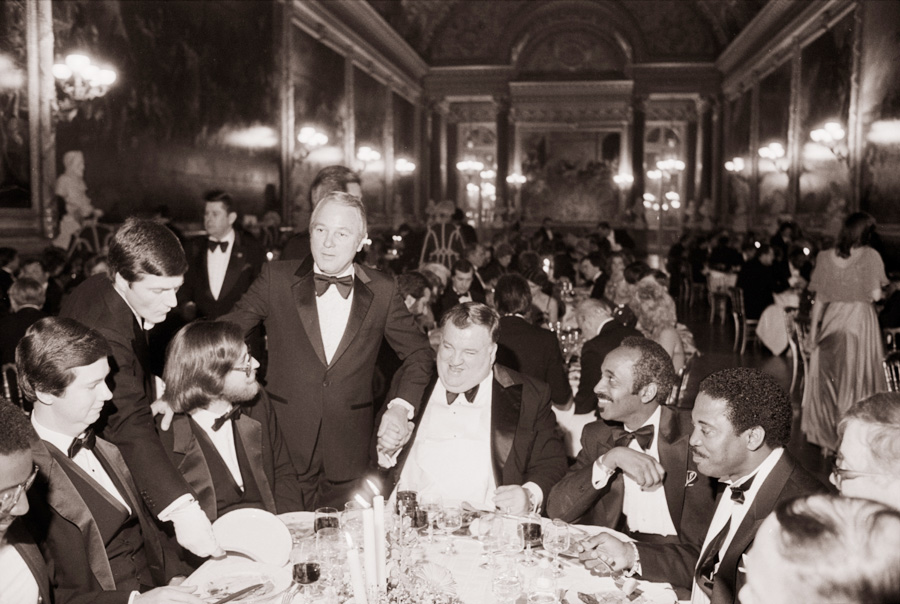
The governor-elect circulated among tables of guests during the black-tie dinner in the former estate of French royalty. State Rep. John A. Alario Jr. told the New York Times, “It was worth the $10,000 just for that dinner.” ©Philip Gould
Johnson: You had been in Louisiana for several years before covering Edwards’ trip to France. When did you move here?
Gould: I moved here in ’74, this was ’84, so I had been here ten years. I was not a stranger to the place.
Johnson: By then what was your take on Edwards? Had you covered him before?
Gould: I photographed him a little bit when he was governor the first or second term. The first night I was in Louisiana, staying in a hotel, he came on because he was pitching a new constitution. I just remember seeing him, noting his accent and the shininess of his skin.
Johnson: He made an impression.
Gould: You know the ironic thing with Edwards, I photographed his third inauguration and who shows up but Jerry Brown.
Johnson: From California?
Gould: Right. He was governor at the time, I think … Apparently somehow, some kind of way, they became friends.
Johnson: Well, I think, Edwards is a charmer. I think he has an ability to get people into his circle. I know he and Jimmy Carter went hunting one time. Obviously Edwards was a major powerful political figure and circulated in that community, in spite of his playboy reputation, but …
Gould: He and Carter were not, the public perception was that they were not political soul mates.
Johnson: He knew how to play all those audiences.
Gould: On that Paris trip, he also said, looking around the room, “I think we could actually form a legislative quorum. And we could raise some taxes right here and you could go back and say you never raised taxes in Baton Rouge.”
Johnson: An article by Ray Blount in People magazine was full of quips Edwards was making. Apparently at one point, Edwards met with a nun from Rayne, Louisiana. Were you witness to this encounter?
Gould: Yes. She said, “Governor I want to give you French kiss.” He said, “That’s all right sister, just don’t let me get into the habit.”
That’s quick, that’s really quick.
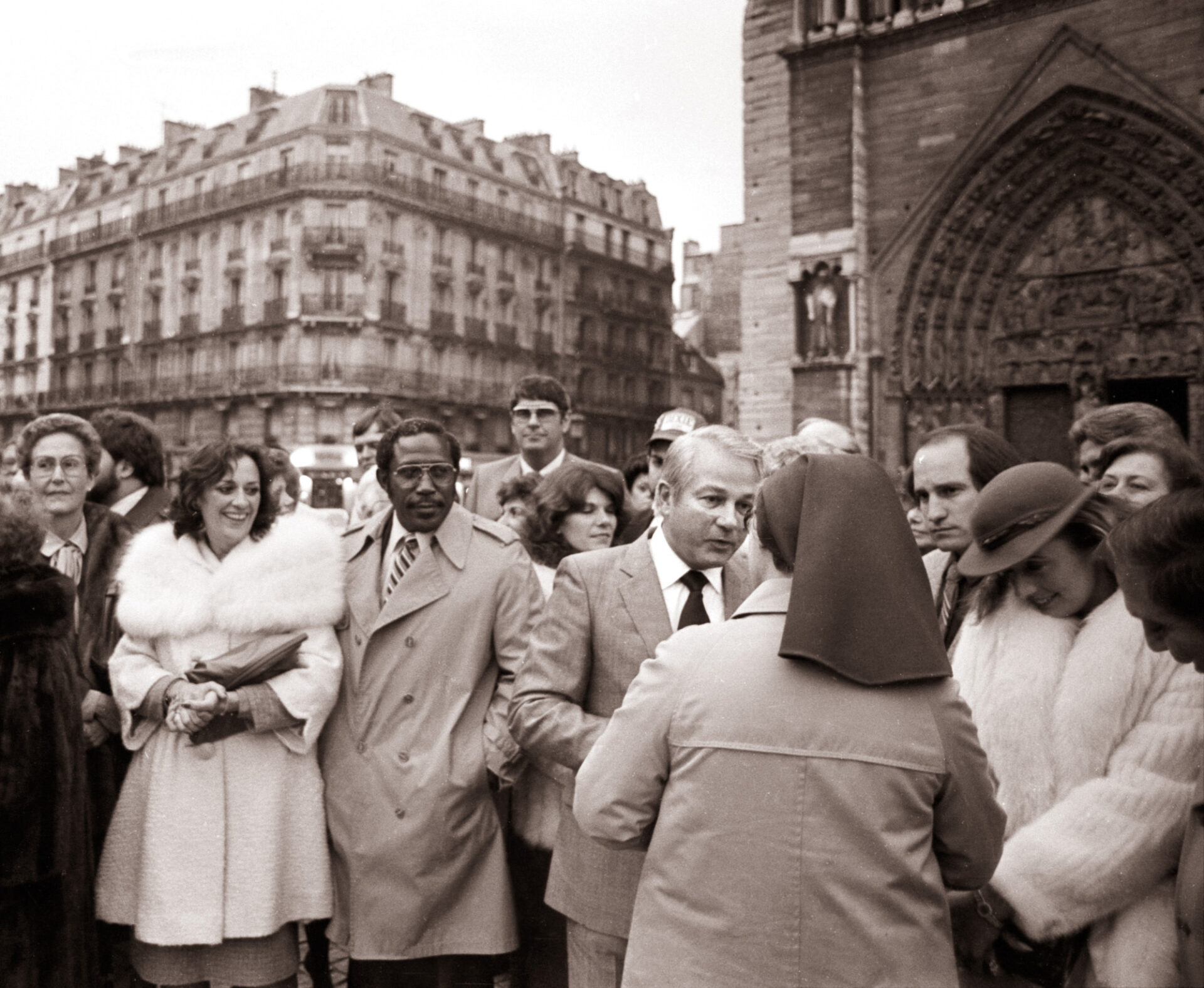
Following Mass at Notre Dame Cathedral, Edwin Edwards met Sister Benedict, a nun originally from Rayne, Louisiana, assigned to Paris. She jokingly offered the governor-elect, in her own words, a “French kiss.” ©Philip Gould
Johnson: Nobody’s better, nobody’s better at that. Especially in the political world. Edwards was almost a stand up comedian with a sharp comeback on everything.
Gould: You know the names of the chartered planes that took the group to France were Evangeline and Gabriel.
Johnson: Yes, right before they even took off this trip had legendary status. How would you describe the general tone of this trip and the crowd?
Gould: Edwards is enough of a statesman to do the right thing. The first night we were there, we actually went to a wreath-laying ceremony at the Arc De Triomphe.
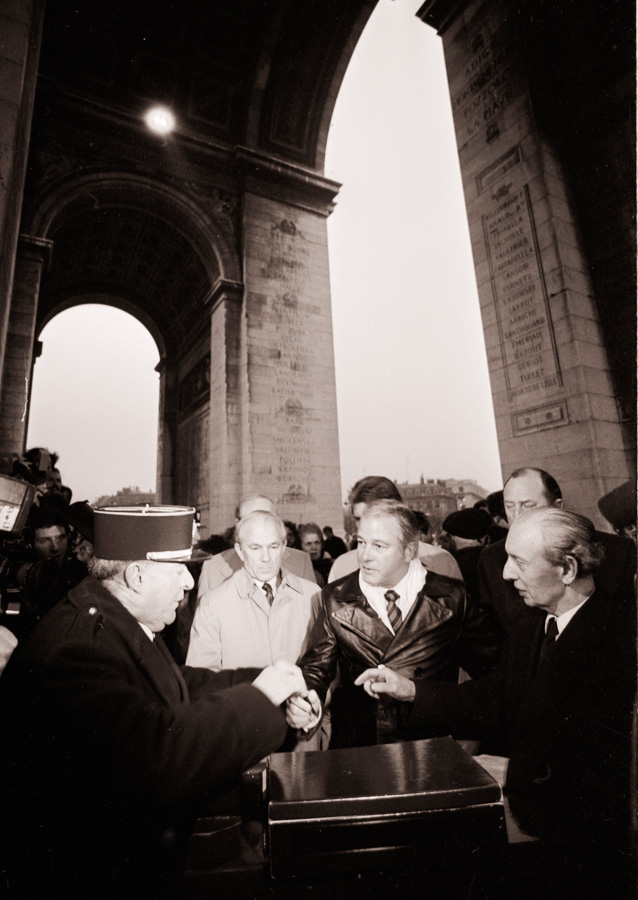
Edwin Edwards attended a ceremony at the Tomb of the Unknown beneath the Arc de Triomphe in Paris, January 1984. ©Philip Gould
Johnson: In this photo at the Tomb of the Unknown he does look very statesmanlike. But then that photo you took at Versailles, just based on my outside opinion, it looks like something out of Dynasty. The women and the hairdos and the lavish clothes — at least that’s the impression it conveys to me.
Gould: Everyone was dressed up. This was an opportunity for people who were not worldly to party in a world-famous place. I’m sure for some people it was the highlight of their lives. Edwards was very good at just keeping it all, he was always, always, always humorous, always fun, and always the source. He emits a lot of personal energy.
Johnson: In a crowd of 600 people, that’s pretty remarkable.
Gould: I remember we went to see Jacques Chirac, who was the mayor of Paris, and I have a photo of that.
Johnson: That dates before he became president of France then?
Gould: Edwards enjoyed it all. I understand Chirac has a relationship with Louisiana. He studied here as a graduate student. I heard his thesis was about the Port of New Orleans.
Johnson: That’s interesting. I knew he studied at Harvard, but I did not know he also spent time in Louisiana.
Gould: Anyway, Chirac gives a welcoming talk using very eloquent speech. The Académie française would have been proud of it. One five-syllable word after another.
Johnson: Did he reference Louisiana in the speech?
Gould: Oh, I am sure he did mention the long history with Louisiana and the bonds that go back centuries. All of that.
Jacque Chirac finishes his speech. Edwards gets up and says, “Monsieur Chirac, parle le bon français.”
Johnson: Very funny.
Gould: Yeah, this is classic. Many Cajuns feel that they don’t speak le bon français as the French do. Any doubts you had, Chirac’s speech is all the proof you need.
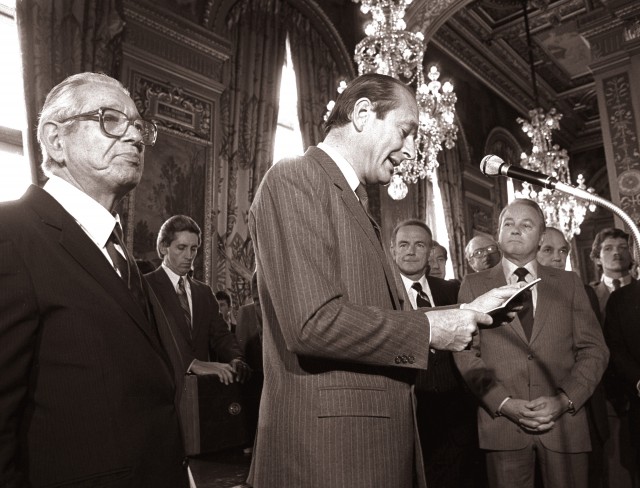
CODOFIL founder James Domengeaux (far left) and then Governor-elect Edwin Edwards met with Jacques Chirac, mayor of Paris and future French president, in January 1984. ©Philip Gould
Johnson: Edwards also met with [then French President] François Mitterrand?
Gould: I was there.
Johnson: And how was that?
Gould: They only let the press in for thirty seconds or so.
Johnson: Because it was a private meeting, or it was just a quick handshake and photo?
Gould: No, Edwards had an audience with Mitterand. Mitterand sat on an antique chair looking very presidential. I’ll show you the shot, but there’s Mitterrand sitting on the couch looking very much like “l’etat, c’est moi.”
Johnson: The way a French official would hold himself.
Gould: Right. “I am the President of France. We have over four hundred varieties of cheese and so forth.” You are going to get me in trouble.
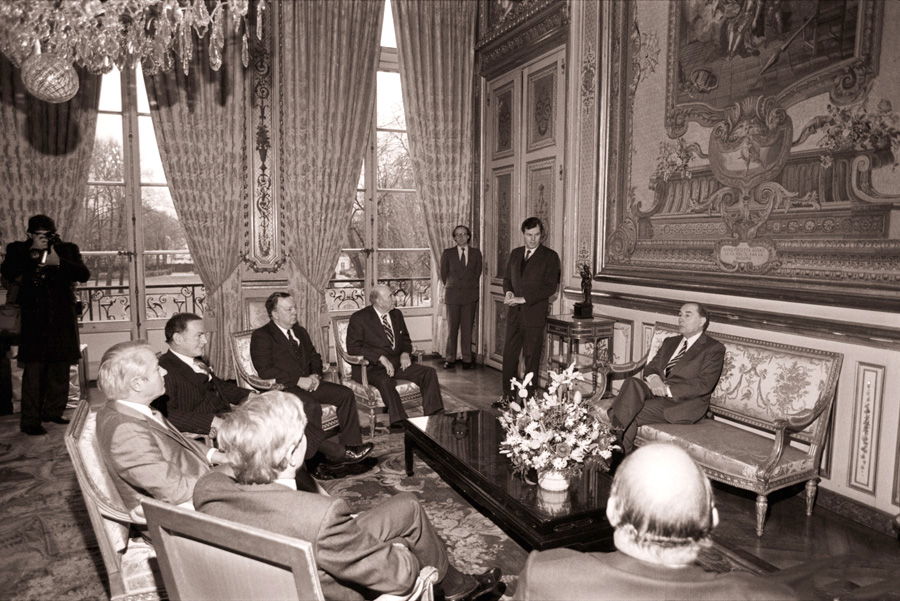
French President François Mitterrand met with the Louisiana delegation at the Élysée Palace. ©Philip Gould
Johnson: Did you get a sense that a lot of people on this trip are really trying to connect with Louisiana’s French heritage?
Gould: They really billed this as your opportunity to reconnect with the Mother Colony, the colonial power. I’ve heard it from more than one French publisher or editor or whatever. The French have this dream about Louisiana as the lost colony what with the plantations, the slaves, the French language, the Cajuns, the jazz and so forth.
Johnson: At the conclusion of all of this photo assignment, what did you walk away with? Did you have any distinct impression? Did your opinion of Edwards change?
Gould: The thing I have to say is Edwards is unsentimental. I’ve heard that [Edwards’ biographer] Leo Honeycutt has said this too. I am not going to be making decisions about the affairs of state based on sentimentality. It ain’t going to happen. Did I have anything coming away from it? I felt good about it. I mean I felt good about him becoming governor again.
Johnson: That he would be effective cause he just defeated a reformist, David Treen …
Gould: You mean a Boy Scout reformist?
Johnson: However you want to phrase it.
Gould: An hour and a half to watch 60 Minutes. [Referring to a joke Edwards made about Governor Treen in the 1983 gubernatorial race.]
Johnson: Great lines that came out of every campaign that Edwards ran. Quotes that live in immortality.
Gould: I often think of Edwards as cross between Bugs Bunny and the Road Runner. The Republicans at the time were akin to the Coyote.
Johnson: Trying, but always having the bomb right there in their hands, as it explodes?
Gould: Beep, beep!
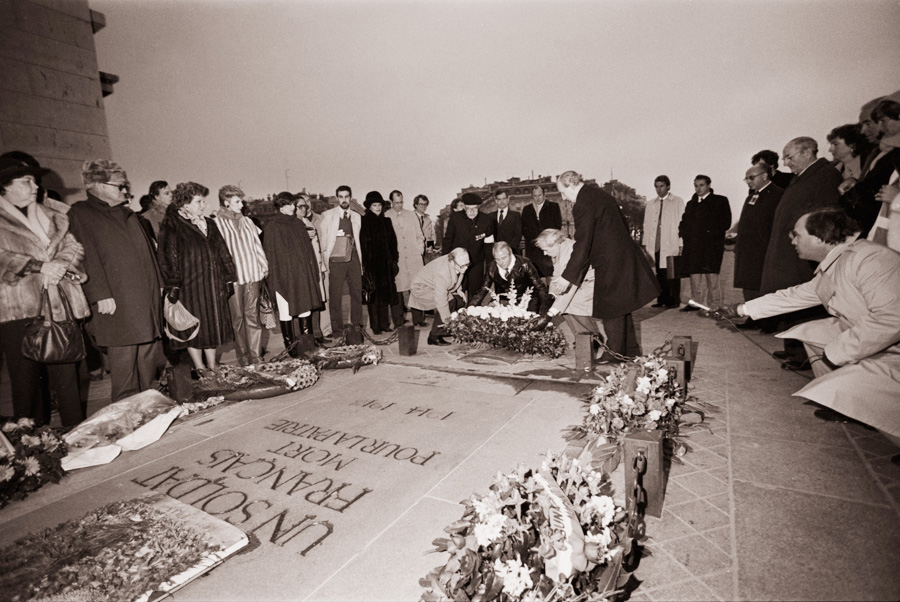
Edwin Edwards placed a wreath at the Tomb of the Unknown Soldier at the base of the Arc de Triomphe. ©Philip Gould
Johnson: Were there any other moments that really stood out from that trip?
Gould: Edwards held a press conference at the American ambassador’s residence. Somebody asked him if he ever thought about running for president? He admitted to thinking about it. Another reporter asked him, he said, well now that you’ve been here in Paris and done all of this, how’s it going to feel to go back to Louisiana and be a mere Governor?
He turned and said, “In Louisiana there is no such thing as a mere governor.”
The reporter obviously didn’t live in Louisiana.
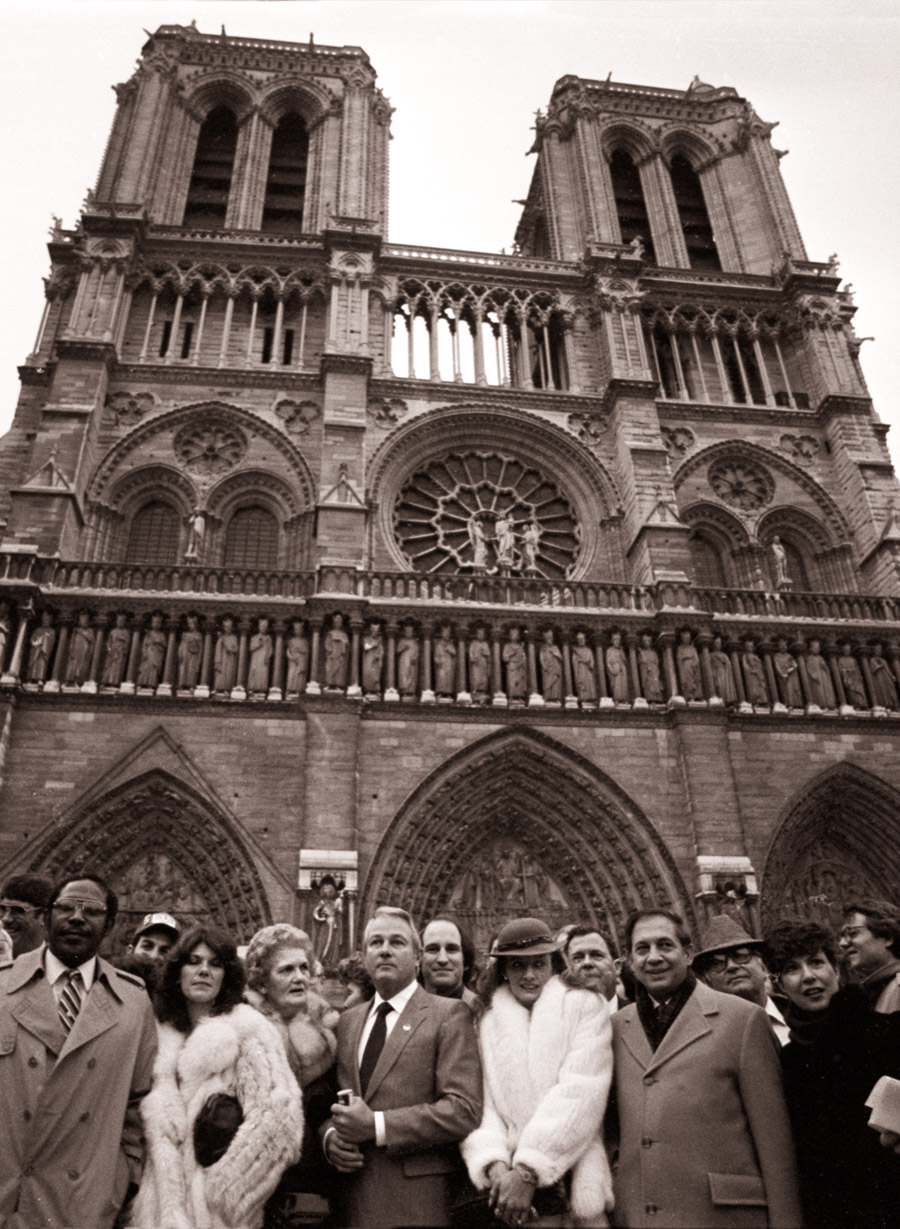
Edwin Edwards and the Louisiana delegation attended Mass at Notre Dame Cathedral in Paris, January 1984. ©Philip Gould
Johnson: Afterwards the IRS looked into this and a lot of people just considered the whole notion of a governor taking his roving party to France that would help pay for his campaign debt as rather sleazy and unethical. Did you ever hear any rumblings of that, or anybody in the press on that trip who questioned it or afterwards? It’s very unconventional. I’m never heard of anything like it before or since.
Gould: I don’t know how many serious journalists were on this trip. In general this was a feel-good trip to Paris to pay off a campaign debt.
Johnson: No façade about it?
Gould: No more significance than that. I guess you can have fundraisers of any kind you want.
Johnson: Did get the impression that some people on this trip were trying to win favor with the governor, or at least be in this circle so that they could have access to him?
Gould: I have no evidence to that fact.
Johnson: It almost seems like it would naturally happen. Why else would someone pay $10,000 in 1984, which was a substantial amount of money?
Gould: If that kind of thing happened, I was not in the room.
Johnson: Philip, you’re one of the great documentarians of this state’s culture and history. Do you think Edwards embodies anything specific about Louisiana’s character?
Gould: I am a photojournalist, a documentary photographer, and an amateur of politics and history. In other words, I love it. I have always thought that a successful politician will develop a sense of oneness with the voting public. His or her public. I think Clinton was a master at it. You felt like the guy was at your house and you were sitting around the table. I think Obama is good at it in different ways. But I think Edwards was a master of it. The oneness was not only with the people, but it was with the times.
I think he embodied the cultural and political energy of Louisiana at that time. Now having said that, he’s a bit like FDR [President Franklin Delano Roosevelt]. A lot of people hated FDR. It’s the same with Edwards. Talk to any good and right businessman in Louisiana. They didn’t like him much at all.
Johnson: These politicians tend to — people run hot or cold on them. There’s an impassioned feeling on both sides.
Gould: That time has passed for Edwards. He got nowhere running for Congress in 2014.
Johnson: Have you seen him since he got out of prison?
Gould: A couple of times. I am not sure he recognized me, I really didn’t know him that well. He could still muster a joke but the spontaneous eloquence was not quite like before.
••••••••••
To view more of Philip Gould’s photographs, visit his website: www.philipgould.com.
